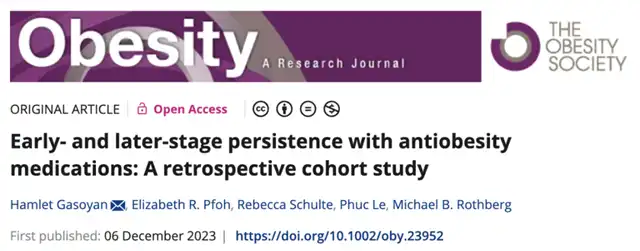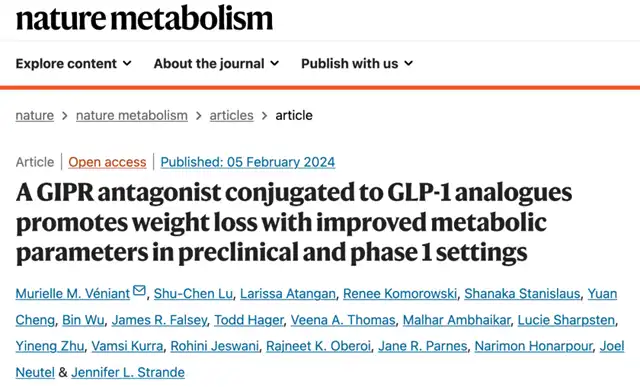Adherence Challenges with Semaglutide & GLP-1 Agonists for Weight Loss
- Normal Liver Cells Found to Promote Cancer Metastasis to the Liver
- Nearly 80% Complete Remission: Breakthrough in ADC Anti-Tumor Treatment
- Vaccination Against Common Diseases May Prevent Dementia!
- New Alzheimer’s Disease (AD) Diagnosis and Staging Criteria
- Breakthrough in Alzheimer’s Disease: New Nasal Spray Halts Cognitive Decline by Targeting Toxic Protein
- Can the Tap Water at the Paris Olympics be Drunk Directly?
Adherence Challenges with Semaglutide & GLP-1 Agonists for Weight Loss
- Should China be held legally responsible for the US’s $18 trillion COVID losses?
- CT Radiation Exposure Linked to Blood Cancer in Children and Adolescents
- FDA has mandated a top-level black box warning for all marketed CAR-T therapies
- Can people with high blood pressure eat peanuts?
- What is the difference between dopamine and dobutamine?
- How long can the patient live after heart stent surgery?
Adherence Challenges with Semaglutide & GLP-1 Agonists for Weight Loss
Less than half of those who can persist in using semaglutide for a year, what happens when they stop taking it?
Due to the tremendous success of semaglutide, this GLP-1 receptor agonist class drug has become a household name almost overnight.
Semaglutide was initially developed by Novo Nordisk as a glucose-lowering drug for type 2 diabetes. In June 2021, the FDA approved semaglutide for marketing as a weight-loss drug (brand name Wegovy). The drug is a glucagon-like peptide-1 (GLP-1) receptor agonist that mimics its action, reducing hunger, decreasing food intake, and reducing calorie intake, hence showing remarkable effectiveness in weight loss. Additionally, recent clinical trials have also shown that GLP-1 receptor agonists like semaglutide can reduce the risk of cardiovascular diseases.
However, despite the outstanding effectiveness of new generation weight-loss drugs like semaglutide, their long-term tolerability remains relatively poor.
Recently, researchers from the Cleveland Clinic published a paper titled “Early- and later-stage persistence with antiobesity medications: A retrospective cohort study” in the journal Obesity.
The study revealed that among obese patients prescribed weight-loss drugs (semaglutide, liraglutide, phentermine-topiramate, naltrexone-bupropion, or orlistat) by their doctors, 44% were still using the medication after three months, 33% after six months, and only 19% were still continuing the medication after one year.
Among them, the proportions of obese patients using semaglutide who were still on the medication after three months, six months, and one year were 63%, 56%, and 40%, respectively. In other words, less than half of those who could persist in using semaglutide for a year.

Consistent use of these drugs, such as semaglutide, can make people feel fuller faster and for longer periods, thus achieving effective weight loss. So why couldn’t these obese patients persist in using them?
In fact, non-adherence to medication regimens is not uncommon among such patients. For other diseases like type 2 diabetes, chronic obstructive pulmonary disease, and hypertension, non-adherence to medication is a well-known phenomenon. Studies have shown that nearly half of patients using antihypertensive medications stop taking them after one year.
The willingness to adhere to medication regimens may be influenced by factors such as the symptoms of the disease (e.g., lack of obvious symptoms of the disease itself); various aspects of the healthcare system (e.g., patients’ ability to seek medical care or the cost of medication); and the characteristics of the treatment itself (how often medication needs to be taken, or the tolerability of side effects). In fact, the frequency of medication use for GLP-1 agonists is crucial for diabetic patients; for example, those using GLP-1 agonists once a week (semaglutide) are more likely to adhere to the treatment than those taking medication once daily (liraglutide).
The potential side effects of GLP-1 agonists have also raised concerns. In clinical trials, the proportion of patients discontinuing GLP-1 agonist therapy ranged from 15% to 25%. About half of the discontinuations were due to side effects—mainly gastrointestinal problems.
However, overall, the side effects of GLP-1 agonists are often mild to moderate. Some people experience nausea during the first four weeks of using the medication, but if the dose is increased, the situation may worsen, and diarrhea, constipation, fatigue, and belching may also occur.
But it’s worth noting that compared to other weight-loss drugs, obese patients using GLP-1 agonists show much greater persistence.
Image
Clinical trials have shown that the maximum weight loss with GLP-1 agonists takes about a year to achieve, with approximately 6% weight loss achievable within 12 weeks, which motivates people to adhere to treatment.
Furthermore, the popularity of GLP-1 agonists has led to a tight supply of the drug globally, which may also lead to some patients discontinuing the medication due to the inability to continue obtaining it.
Although there is some controversy over the sustainability of GLP-1 agonists in weight loss, the more relevant question is what happens when people stop this treatment.
These drugs may be hailed as “game changers” in helping people lose weight, but several clinical trials suggest that when the medication is stopped, the lost weight rebounds significantly. For example, one clinical trial showed that participants treated with weekly semaglutide regained over half of the lost weight within a year after discontinuation. And a recent clinical trial showed that those using tirzepatide (a dual-target GLP-1 agonist) also regained over half of the lost weight after discontinuation.
The conclusion drawn from these studies is that weight can be maintained as long as the medication is not stopped.
It has long been known that regardless of the weight loss method used, people typically regain weight once the intervention stops. Weight loss causes some biological and energy changes that may make you healthier but also drive you to regain lost weight. However, the way these new generation weight-loss drugs work may mean a higher likelihood of rebound. Because the injected synthetic GLP-1 is different from the endogenous GLP-1 produced in the body. Normally, GLP-1 is released after meals, but it doesn’t last long and is quickly broken down. In contrast, injected synthetic GLP-1 has a higher dose and longer duration, equivalent to 10 times the normal active GLP-1 levels produced after a big meal. This not only makes you feel fuller but also maintains that feeling of fullness even though your body tries to make you feel hungry. However, maintaining such high levels of “fake” GLP-1 may lead to a decrease in the endogenous GLP-1 produced by your body.
So, if you continue to take the medication, artificially maintaining high GLP-1 levels, none of this is a problem. But if you suddenly stop the medication, active GLP-1 levels drop sharply, and your body is no longer restrained, hunger and appetite may return with a vengeance. Combined with other factors, this can result in the rebound of lost weight.
Therefore, we need to realize that these “game changers” in weight loss are making weight loss easier, but our focus should be on the main challenge of weight maintenance.
It is worth mentioning that on February 5, 2024, researchers from Amgen published a paper in the sub-journal Nature Metabolism of Nature. Their developed dual-specificity molecule—AMG 133, combining a fully human monoclonal anti-GIPR antibody with two GLP-1 analogs, demonstrated acceptable safety and tolerability, as well as a significant dose-dependent weight loss in a phase 1 randomized, double-blind, placebo-controlled clinical trial targeting obese participants. In the high-dose group, participants received injections once every four weeks, and after the third injection (day 85), the average weight loss was 14.5%.
More importantly, AMG 133 showed excellent persistence, with weight loss maintained at over 11% at day 150 (5 months) after treatment.

Paper links:
https://onlinelibrary.wiley.com/doi/10.1002/oby.23952
https://www.nature.com/articles/s42255-023-00966-w
Adherence Challenges with Semaglutide & GLP-1 Agonists for Weight Loss
(source:internet, reference only)
Disclaimer of medicaltrend.org
Important Note: The information provided is for informational purposes only and should not be considered as medical advice.



